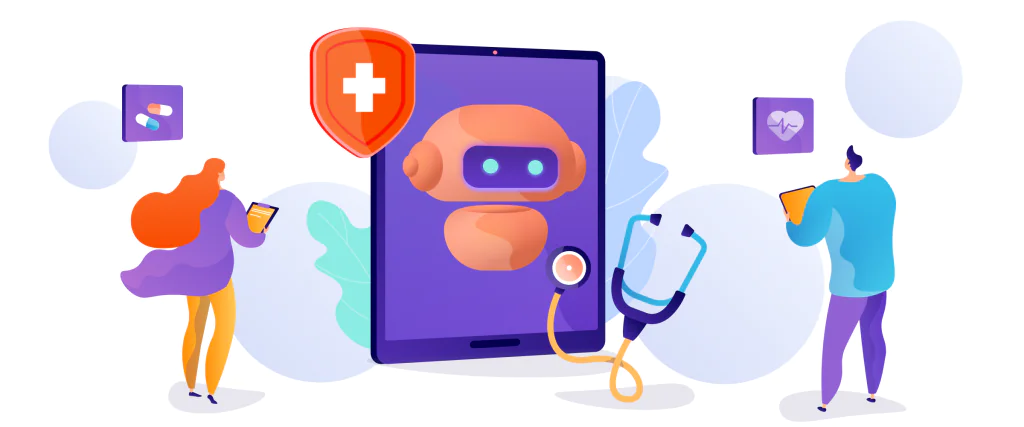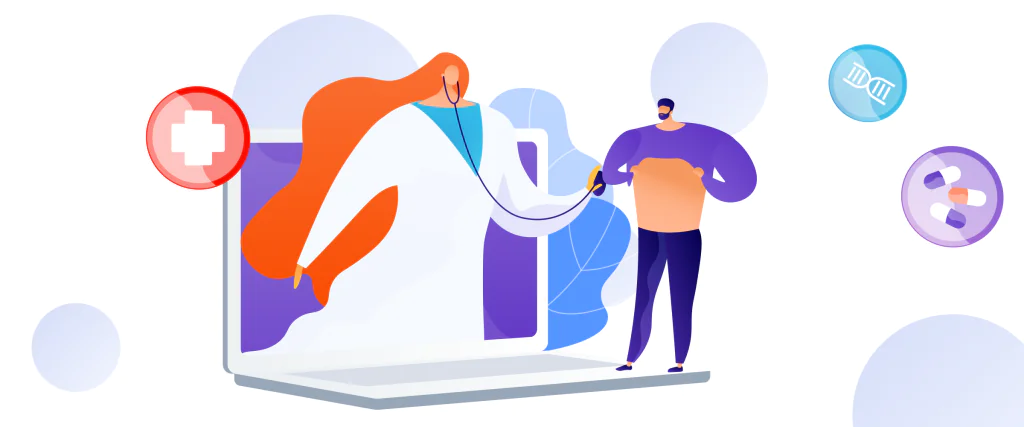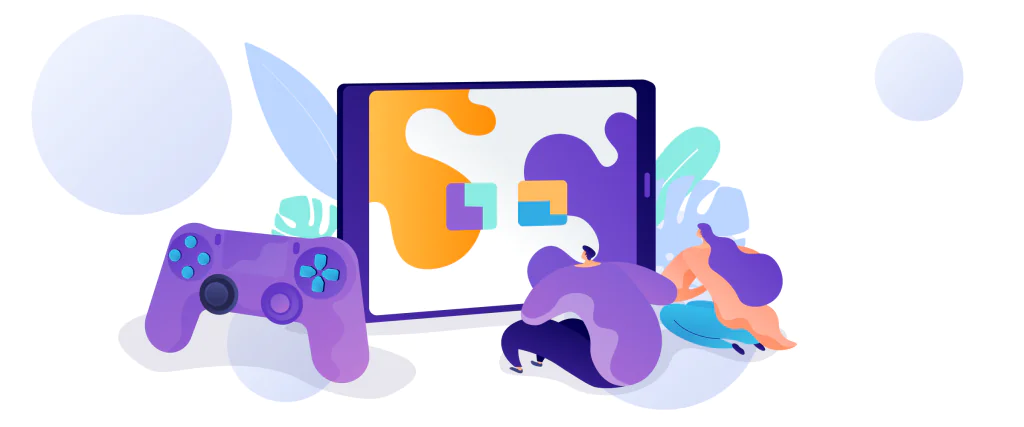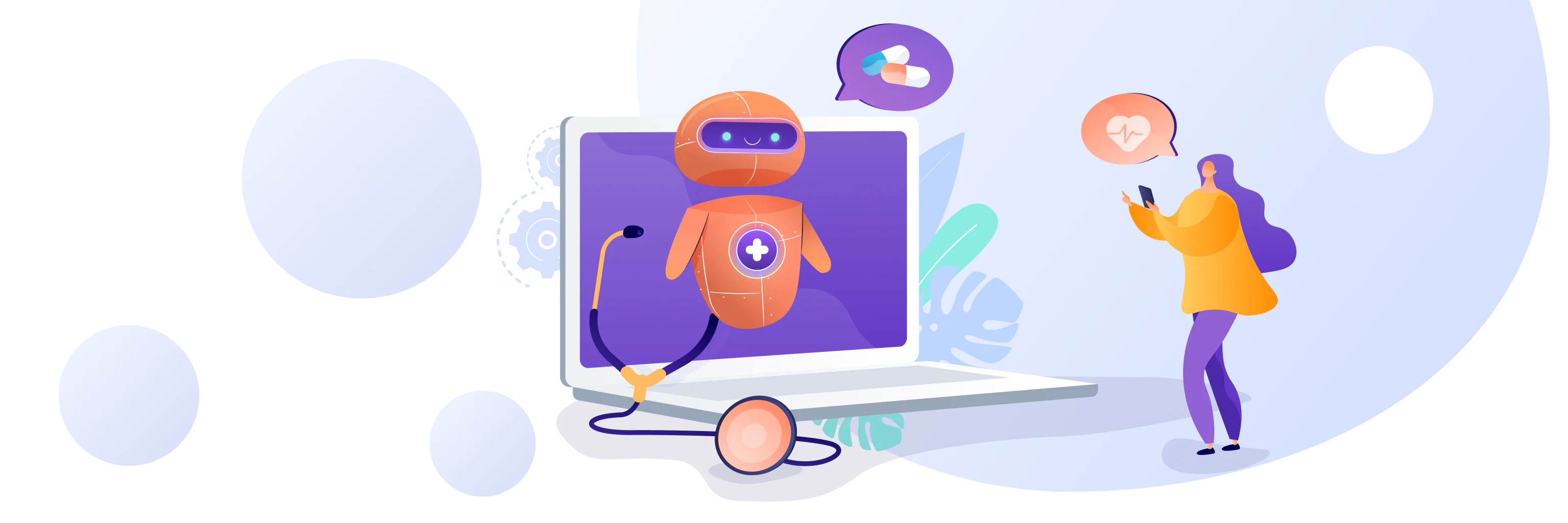Table of contents
When you hear about AI-based software development for healthcare, what do you imagine this tech can do? Are you thinking about AI-powered devices that tune into your brainwaves? Or do you think of technology capable of diagnosing diseases remotely? Perhaps, you can even imagine talking to a robot-therapist?
Or do these things sound like something out of a sci-fi movie?
It turns out that all of it is true now. The applications of artificial intelligence in healthcare are revolutionizing many medical fields. Already, VR and AR solutions can help people who had almost no hope for recovery only a decade ago. Moreover, various methods of AI automation in healthcare make help available to those living in remote communities.
AI technology is literally saving lives. Keep reading to find out how it does it and what we can expect to see in the future.

Uses of AI-Based Software Development in Healthcare 2021
Artificial Intelligence in Healthcare: Assisted Therapy
The most basic form of AI-assisted therapy is the use of a chatbot for primary therapeutic interventions. Basically, the AI acts as a therapist and offers support and guidance in a patient’s moment of need.
The efficiency of psychotherapy has long been proven. But now, you might wonder whether Artificial Intelligence can replicate the effects of talking to a human therapist.
According to an extensive study from Stanford University, AI is capable of effectively helping people suffering from anxiety and depression.
The most crucial benefit of AI-assisted therapy is that it makes mental healthcare accessible to people who have no other way to get it. At the moment, there are both free and paid therapy apps that offer different interventions for depression and anxiety. The user, essentially, receives a type of self-guided therapy with AI acting as an assistant on this path.
Chatbots can also be used as support in a traditional therapy course. Patients can turn to them between sessions when they require immediate help. This both improves the patient’s mental state and makes therapy more affordable.
Moreover, chatbots do not only offer support and guidance. These healthcare AI software solutions also collect data about your condition daily. Then, they can analyze this data to provide insights into anxiety or depression-inducing patterns that a therapist can use to improve your treatment.
Using the app, you can also track your own progress. In itself, this kind of tracking can be highly beneficial for a person struggling with challenges, like depression. To have tangible proof of one’s positive progress is a vital motivator.

AI Automation in Healthcare: Chatbots and Telehealth for Remote Areas
The COVID-19 pandemic highlighted many problems within the healthcare system. One of the biggest among them is a desperate need to make healthcare services more accessible. And AI-based software development can do that.
Conversational artificial intelligence and telemedicine have saved hundreds of lives already. Moreover, these technologies are fast becoming indispensable for offering preliminary diagnostics and ongoing treatments.
Healthcare AI software solutions allow doctors to stay connected with patients no matter where they are located. In addition, they can offer basic education, support, and guidance to people who require immediate help or ongoing supportive treatments.
The potential of artificial intelligence in these areas is immense, states a study published by the Institute of Electrical and Electronics Engineers. Its full transformative power can be realized in rural areas, especially in developing countries where access to healthcare is limited. And the situation got exponentially worse with the added strain of pandemic restrictions.
At the moment, there are technologies in development that will enable immediate and effective use of telemedicine in emergencies. However, this field is only growing. Therefore, everyone with ambitions to create an outstanding app that can change the world should consider this industry.
AI-Based Software Development: VR Treatments for PTSD
Exposure therapy has proven to be a highly effective treatment for phobias and PTSD. VR tech has the power to enhance these treatments and make them much more accessible. Already, there is solid evidence that VRET (VR Exposure Therapy) can help treat phobias. In addition, studies of using this treatment as part of PTSD therapy showed positive results, reports Frontiers.
Unfortunately, at the moment, this technology isn’t widely available in clinics. Therefore, applications of VRET are limited. Also, there are only studies conducted with soldiers and veterans. Therefore, broader possibilities of VR healthcare AI solutions are still unexplored.
However, there is hope that making the tech accessible will enable researchers and therapists to develop more effective treatments. We are only starting to acknowledge the severity of the impact that PTSD has on society as a whole. And while there are some effective treatments for this condition, they are limited. So, this branch of applying artificial intelligence in healthcare is still full of possibilities.

Specialized Healthcare AI Software Solutions: Healium
The applications of AI-based software development for healthcare take many forms. But none of them so far are as futuristic as Healium, an app that tunes into your brainwaves. The app claims to be an ‘immersive media’, as Healium’s CEO said to Forbes.
This app uses wearable devices to ‘read’ the body’s electricity and help users create their own unique relaxing world. The goal of Healium is to help fight anxiety and ease stress management.
The app uses a combination of AR and VR tech, game design, and storytelling, all powered by research in neuroscience. The result is a solution that can help people manage anxiety through techniques of immersive meditation.
Healium is currently unique, but its rising popularity indicates that it won’t be the only app of this kind. The pandemic made anxiety levels skyrocket worldwide. Therefore, various stress-reducing techniques are popular as never before. Artificial intelligence applications in healthcare are most efficient for this purpose as AI can adapt to every user’s individual needs. Therefore, it can offer highly personalized treatments.

AI-Based Software Development in Healthcare: Prescription Video Games
Here is the validation of all those hours spent playing by all computer gamers worldwide. FDA approved the first computer game as a valid treatment for children with ADHD. Granted, it’s not an excuse to spend 14 hours playing PUBG every day. However, it’s clear evidence that games can be a power for good.
Prescription games are very different from regular ones. But they rely on the same interactive technology. The first-ever FDA-approved game went through seven years of clinical trials and proved that an interactive play could make a quality change for some people’s lives.
At the moment, this technology is only used for ADHD. But the potential for applying AI-based software development in this area is tremendous. So, if you have an app idea, you should go for it!
Bottom Line: AI-Based Software Development for Healthcare Is Saving Lives
There are many uses for artificial intelligence in healthcare and even more are possible. This is a field that requires more ideas and products that can improve and even save countless people’s lives. Today, there are solutions that make healthcare accessible. But there is a lot of room for growth. An experienced AI software development team working with scientists and powered by innovative ideas can transform the world by improving healthcare.




